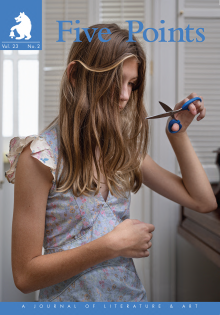Five Points Vol. 23, No. 2
FallSample Content
Lucienne S. Bloch
Odds and Ends
I think of my essays as walking papers, not those metaphorically handed to people being fired from jobs, but the outcomes of my daily pre-work walk in Central Park, step after step, a rhythmic pace that can and often does prompt a word, a phrase or, better, an idea with juice in it, electricity, the luster of usable. The rest is logistics, demand and supply of verbal vehicles that carry and deliver meaning, one word after another, sentence after sentence, or fail to do the job.
Deliveries I formerly received regularly and still need are now fewer and farther between, or stalled in my supply chain. I did get an unusual suggestion on my walk one morning last month when I reached into the pocket of a jacket I hadn’t worn since the previous spring and found a torn fragment of a handkerchief in it. Could I do a snippet here, a shred there, scraps from the ragbag of my memory stitched side-by-side with current material? Would the bits and pieces hold together? work with each other? Fall apart and scatter like dandelion fluff in a breeze? Label me suspect? Flighty? Desperate for something, anything, to put on paper?
I have to wonder if I have lost my long-sightedness, or if that suggestion I got is related to the often erroneous snatches of an aging memory, or if some underlying connective logic will be there, elusive perhaps but operational. I also question the sustainability of this approach, and wonder if it will die naturally, gasping for breadth, length, and time. Still, it is doable, if not customary, and worth a try.
Here are some odds and ends that recently knocked on the door to my attention; new ones may rap spontaneously, in the thick and thin of an irregular essay evolving over several days, weeks more likely, I don’t have deadlines to meet. These pieces are not stitched together. Tailors do what they advertise as invisible mending. Perhaps that may be at work here, the unseen business of gray matter threaded with words.
A friend I was talking with on the phone used a term I never heard before: executive function. This doesn’t refer to CEOs and such, though they likely possess that function, but pertains to a variety of behavioral traits and organizational skills, as my online query revealed. Among those skills and personal attributes are a working memory, emotional control, a planning ability, attentiveness, adaptable thinking, good management of time, self—monitoring. I get borderline grades on a few of those traits and abilities, flunk some. Even so, flunking isn’t necessarily final. Tests can be retaken, scores improved, behaviors practiced. Make—do is also functional.
The air this morning felt heavy, pregnant with tiny inklings of possibility, a gumbo of foggy notions waiting for a passing breeze to do its cloud-lifting job, deliver those inklings waiting to be born, to breathe, to become ideas that toddle across a page in words, or they don’t.
Time to quit for the day, my spine says so; I can only sit for a few hours. I don’t wear a watch on my wrist, or hanging from a fabric or metal chain around my neck, or pinned to a dress or a jacket lapel as my grandmother wore her ornamental but accurate timepiece, now in its original velvet box on a shelf in my closet. There is a small battery-powered clock on my desk, but its face is turned to the wall. I don’t like constant reminders of time’s inexorable passage. I don’t like time passing is more to the point. If I could I would deep-freeze the memorable moments of my life up to the present one, thaw a few occasionally, savor them again. Little green peas can be frozen without losing their shape, color, or taste. Instead, I have to settle for language’s preservative powers, effective at best, more often faint whispers of what was, and when and where, but only seldom why.
I often wish my essays weren’t CliffsNotes, study guides to myself. That’s the self-attention inherent to writing personal essays. Yet I know my work interests other people. That’s the mystery of language. . . .

